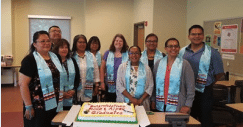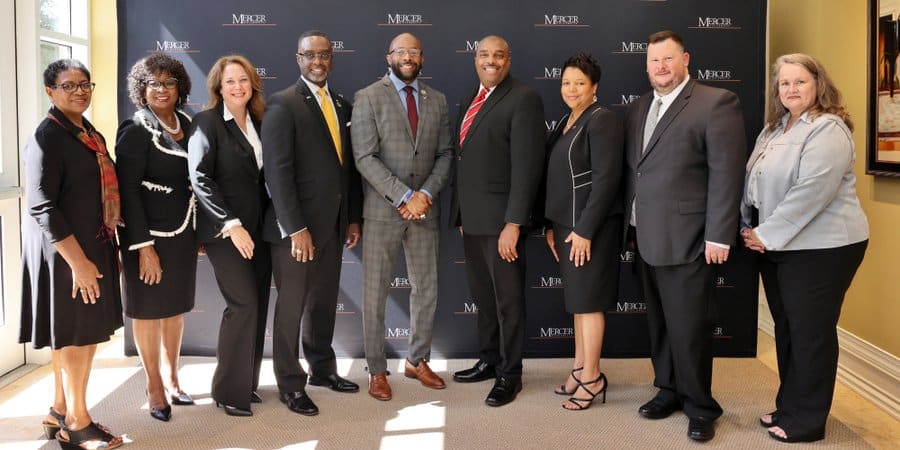21 Nov2022
By Kansas City Teacher Residency
Philanthropist MacKenzie Scott has given away nearly $2 billion over the last 7 months, and a Kansas City nonprofit just became the latest recipient of her generosity. Kansas City Teacher Residency (KCTR) is pleased to announce the acceptance of a $5 million donation. This award will be utilized to support KCTR’s ongoing work and secure the organization’s future for the long term. These funds will allow KCTR to recruit, cultivate, and retain more diverse teachers in the communities we are serving and in turn provide equitable classrooms for all students.
21 Nov2022
By Savannah Peat
This article was originally published by the University of New Mexico Newsroom.
 A large part of the next wave of Indigenous school principals will come from The University of New Mexico.
A large part of the next wave of Indigenous school principals will come from The University of New Mexico.
There’s a growing group of dedicated learners aiming for that goal, in the Promoting Our Leadership, Learning, and Empowering Nations (POLLEN) program housed in the College of Education and Human Sciences (COEHS).
This immersive, licensure program began in 2016 to put teachers on a direct pathway to higher leadership in Indigenous or Native-serving schools. It has since received roughly $750,000 in grant funding to secure the future of principals and learners.
01 Nov2022
By Brandi Palmer

AACTE is launching “75 Days/75 Ways,” a nationwide campaign to raise awareness of ways to support changes that ensure every student has a highly trained and qualified teacher in their classroom and equitable education is available for all learners.
31 Oct2022
By Brandi Palmer
AACTE thought leaders have spoken about issues ranging from solutions to the teacher shortage to the impact of censorship on education over the past month.
As a result, AACTE has been cited in stories about colleges innovating ways to fill teacher jobs, reinvigorating interest among students in the teaching profession, and celebrating the next generation of teachers.
31 Oct2022
By University of San Diego Media Relations Office
 The School of Leadership and Education Sciences (SOLES) at the University of San Diego has received a $1.5 million grant from the San Diego Foundation to develop and launch the Black InGenius Initiative (BiGI)– a college access and early literacy program for Black students within the San Diego region.
The School of Leadership and Education Sciences (SOLES) at the University of San Diego has received a $1.5 million grant from the San Diego Foundation to develop and launch the Black InGenius Initiative (BiGI)– a college access and early literacy program for Black students within the San Diego region.
Sixty rising sixth graders will be selected for BiGI every year starting in fall 2023. USD will provide students with consistent academic support delivered by SOLES students and faculty trained in neurodivergent teaching, which is the idea that people experience and interact with the world around them in different ways, therefore there is no one “right” way of thinking, learning or behaving.
25 Oct2022
By Lynn M. Gangone

With the onset of a new academic year, AACTE is optimistic about the future of the profession as there has been positive movement in policies and legislation that addresses the challenges educators and educator preparation programs face. However, to maintain forward momentum, we must continue to advocate at the local, state, and federal levels.
As an education leader, your voice matters. That’s why I am asking you to participate in AACTE’s
75 Days | 75 Ways to Advocate for Education campaign. Developed to mark AACTE’s 75th anniversary, the movement centers around raising national awareness of ways to advocate for change that ensures every student has a highly trained and qualified teacher in their classroom and equitable education is available for all learners.
11 Oct2022
By Alexander Cuenca
In 2021, Indiana joined the Consortium for Research Based and Equitable Assessments (CREA), an initiative by the American Association of Colleges for Teacher Education to examine state-level certification assessment scores and their impact on promoting a diverse educator workforce. Our state team consisted of faculty from Indiana University’s School of Education, representatives from the Indiana Department of Education, and school district administrators from Indiana’s public schools. Together, we looked at our state-level data on entrance and content area licensure exams and reached the same conclusion many have reached for decades in Indiana and across the United States: significant pass rate gaps between white and Black teacher candidates.
07 Oct2022
By AACTE

What are the three best reasons to apply for a 2023 AACTE Best Practice Award?
- Showcase your educator preparation program as a model for other higher education institutions
- Receive national recognition from your peers
- Celebrate your team’s contributions that are revolutionizing education for all learners
05 Oct2022
By Kyle Sears
 Mercer University’s Tift College of Education will partner with five local school districts on a three-year, $9.6 million U.S. Department of Education grant project aimed at strengthening the teacher pipeline in order to increase and diversify the teaching workforce.
Mercer University’s Tift College of Education will partner with five local school districts on a three-year, $9.6 million U.S. Department of Education grant project aimed at strengthening the teacher pipeline in order to increase and diversify the teaching workforce.
The award is the largest federal grant in the history of the College of Education, which was formed by the merger of Tift College with Mercer in 1986 and is the largest private preparer of teachers and other educators in Georgia.
04 Oct2022
By AACTE

AACTE is currently accepting entries for the 2023 awards. The AACTE Awards Program recognizes excellence in both member institutions and individuals who have made significant contributions to the field of educator preparation.
For most of the awards, programs and individuals can be either self-nominated or nominated by a third party. The deadline to apply is October 31, 2022. Learn more about the 2023 AACTE Awards, eligibility and criteria.
28 Sep2022
By Kaitlyn Brennan
This weekly Washington Update is intended to keep members informed on Capitol Hill activities impacting the educator preparation community. The views expressed in this post do not necessarily reflect the views of AACTE.
 This week, Washington, D.C. welcomed more than 2,000 in-person participants and 1,500 virtual attendees for the annual National HBCU Week Conference. This year’s conference focused on the work the federal government is doing to meet President Biden’s executive order that directed federal agencies to increase their engagement with HBCUs. Under the order, federal agencies must submit plans each year that describe how they are working to increase HBCU participation in their programs. The conference also comes as a group of Florida A&M University students announced they are suing the state’s university system in federal court alleging that the HBCU has not been receiving its fair share of funding for years.
This week, Washington, D.C. welcomed more than 2,000 in-person participants and 1,500 virtual attendees for the annual National HBCU Week Conference. This year’s conference focused on the work the federal government is doing to meet President Biden’s executive order that directed federal agencies to increase their engagement with HBCUs. Under the order, federal agencies must submit plans each year that describe how they are working to increase HBCU participation in their programs. The conference also comes as a group of Florida A&M University students announced they are suing the state’s university system in federal court alleging that the HBCU has not been receiving its fair share of funding for years.
23 Sep2022
By U.S. Department of Education
 The U.S. Department of Education has announced new awards to help recruit, prepare, develop, and retain a strong, effective and diverse teacher workforce for classrooms across the country through the Teacher Quality Partnership (TQP) grant program. This year’s investment includes 22 new five-year grants totaling $24.8 million through its TQP program. The award recipients represent IHEs and national nonprofits, including three HBCUs and one MSI.
The U.S. Department of Education has announced new awards to help recruit, prepare, develop, and retain a strong, effective and diverse teacher workforce for classrooms across the country through the Teacher Quality Partnership (TQP) grant program. This year’s investment includes 22 new five-year grants totaling $24.8 million through its TQP program. The award recipients represent IHEs and national nonprofits, including three HBCUs and one MSI.
15 Sep2022
By Karen B. Cotton
This article was originally published by Prairie View A&M University.
The teacher population in Texas does not reflect its student population. Beverly Sande, Ph.D., plans to change that statistic with $300,000 in funding from Texas Tech University–Texas Education Agency in collaboration with the University-School Partnerships for the Renewal of Educator Preparation (US PREP) National Center. The award will position Prairie View A&M University (PVAMU) to lead innovative efforts to increase diversity among the number of teachers.
15 Sep2022
In 74 Interview, author Leslie T. Fenwick said the effects were so damaging that ‘the nation’s public schools still have not recovered’
By Greg Toppo
This story was produced by The 74, a non-profit, independent news organization focused on education in America.
 American students have attended school for nearly 70 years under the U.S. Supreme Court’s historic 1954 Brown v. Board of Education decision, which outlawed racial segregation in public schools. But a new book uncovers a little-known by-product of the case: Educators and policymakers in at least 17 states that operated separate “dual systems” of schools defied the spirit of Brown by closing schools that served Black students and demoting or firing an estimated 100,000 highly credentialed Black principals and teachers.
American students have attended school for nearly 70 years under the U.S. Supreme Court’s historic 1954 Brown v. Board of Education decision, which outlawed racial segregation in public schools. But a new book uncovers a little-known by-product of the case: Educators and policymakers in at least 17 states that operated separate “dual systems” of schools defied the spirit of Brown by closing schools that served Black students and demoting or firing an estimated 100,000 highly credentialed Black principals and teachers.
In Jim Crow’s Pink Slip, scholar Leslie T. Fenwick, tapping seldom-seen transcripts from a series of 1971 U.S. Senate hearings on the topic, writes that the loss of Black educators post-Brown was “the most significant brain drain from the U.S. public education system that the nation has ever seen. It was so pervasive and destabilizing that, even more than half-century later, the nation’s public schools still have not recovered.”
15 Sep2022
By Rachel Walker Bowman

In celebration of Hispanic Heritage Month, AACTE is re-posting an Ed Prep Matters article by student member Rachel Bowman that spotlights Mildred Boveda and David Fuentes, who discuss their heritage and what it means in the world of teacher education.
When Mildred Boveda, associate professor of special education at Penn State University, was filling out some basic forms required for an academic appointment, she came to a question that made her pause:
Which of these best describes your race/ethnicity?
- White/ Non-Hispanic
- Black/ Non-Hispanic
- Hispanic
The list went on.
Boveda, an Afro-Latina woman of Dominican descent and complex intersecting identities, had always felt more at home in the Black community. But the erasure of her Latina roots, even just through a checkmark, was not something she could reconcile with.
She checked Hispanic.







 A large part of the next wave of Indigenous school principals will come from The University of New Mexico.
A large part of the next wave of Indigenous school principals will come from The University of New Mexico.
 The
The 
 Mercer University’s
Mercer University’s 
 This week, Washington, D.C. welcomed more than 2,000 in-person participants and 1,500 virtual attendees for the annual National
This week, Washington, D.C. welcomed more than 2,000 in-person participants and 1,500 virtual attendees for the annual National 
